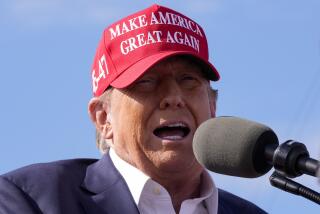Pro-Obama group to decline corporate donations, disclose more
WASHINGTON — A nonprofit advocacy group allied with President Obama revealed Thursday that it would decline corporate donations and release more information about its contributors, but the decision did not placate campaign finance reform advocates who said the organization still provided big donors a conduit for access to the White House.
Jim Messina, who managed Obama’s 2012 reelection campaign and is now chairman of Organizing for Action, announced the changes after a torrent of criticism from reform advocates, as well as Republicans, about the group’s fundraising plans.
“The president has always believed that special interests have undue influence over the policymaking process, and the mission of this organization is to rebalance the power structure,” Messina wrote in an op-ed on CNN.com.
But the group’s opponents said that because Organizing for Action will continue to accept donations in unlimited amounts and disclose them only four times a year — while it maintains close ties to the White House — the group itself could be an avenue for special interests.
“There are opportunities for people to influence OFA that we won’t know about until it’s too late,” said Ellen Miller, executive director of the Sunlight Foundation, a nonpartisan group that presses for more transparency in government.
The new fundraising policies come as Obama struggles to maintain the high ground on the issue of curbing money in politics, an issue he vowed would be a top priority when he first took office. But in his second term, the president has all but dropped efforts to reform the campaign finance system.
His decision to support the launch of the organization, which can accept the kind of unlimited, undisclosed donations he has railed against, dispirited those who want to limit the influence of money. And criticism rose on the news that Organizing for Action was courting Obama campaign bundlers to raise $500,000 as part of a committee that could meet with the president four times a year.
The controversy threatened to overtake the group just as it was escalating its efforts to back Obama up on gun control and the federal budget fight.
Organizing for Action had already stated it would decline donations from federal lobbyists and foreign donors, but Messina said Thursday it would now also refuse money from corporations. However, the group will still accept money from labor unions, according to spokeswoman Katie Hogan.
Eschewing corporate money could hobble its ability to hit its $50-million goal. Last year, party officials pledged to put on the Democratic National Convention without corporate money, but they broke that promise when the host committee failed to raise sufficient funds.
Messina also said Organizing for Action would voluntarily disclose on a quarterly basis the name of every donor who gives $250 or more. In addition, the nonprofit group will post on its website the exact amount of each donation, rather than list contributors under a range of amounts, as previously planned.
And Messina disputed the notion that well-connected fundraisers or wealthy donors were guaranteed access to the president, saying that supporters may simply be included in legislative briefings with administration officials, as members of other groups are.
The first major interplay between Organizing for Action and White House officials is set to come next week, when the group holds a “founders summit” in Washington for top donors and activists. Obama is expected to make an appearance.
Fred Wertheimer, president of the nonpartisan reform group Democracy 21, said the changes laid out by Messina did not solve the fundamental objection reformers have to Organizing for Action: that donors can give unlimited sums to a group “functioning as the arm of the Obama presidency.”
“The unlimited amounts provided to OFA create opportunities for the individual donors and bundlers of these funds to buy corrupting influence over Obama administration policies and decisions,” he said. “At a minimum, they create the appearance of such corrupting influence.”
More to Read
Sign up for Essential California
The most important California stories and recommendations in your inbox every morning.
You may occasionally receive promotional content from the Los Angeles Times.










